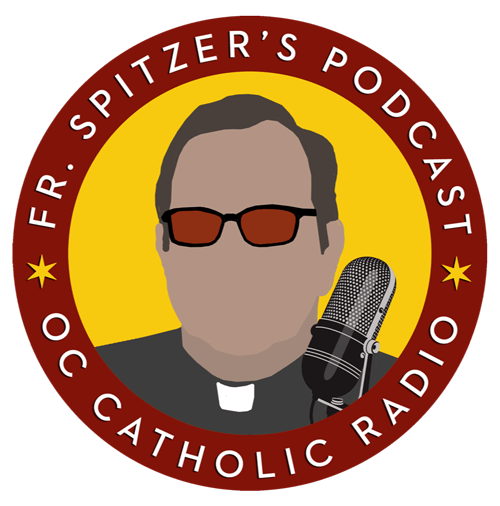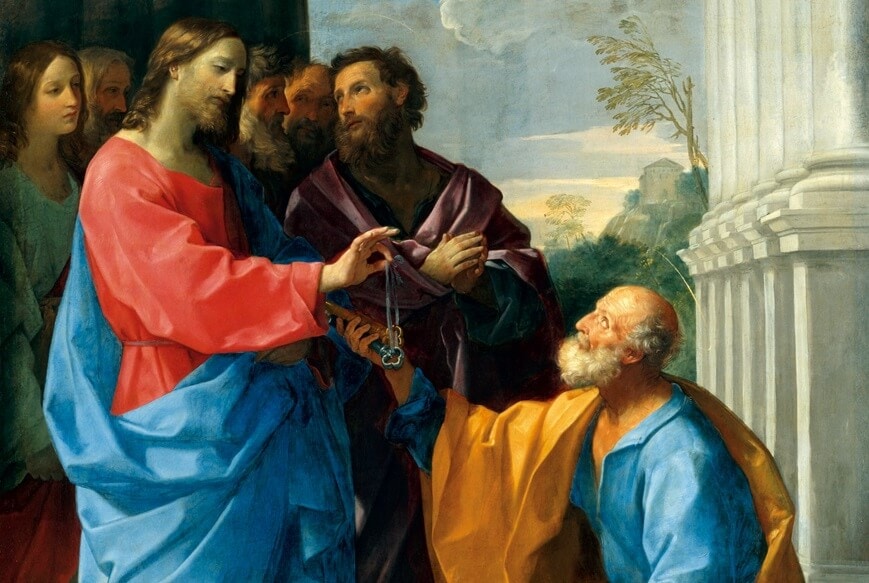The Commissioning of Peter in the Gospel of John
Share this article, via:
After Jesus had revealed himself to his disciples and eaten breakfast with them,
he said to Simon Peter,
“Simon, son of John, do you love me more than these?”
Simon Peter answered him, “Yes, Lord, you know that I love you.”
Jesus said to him, “Feed my lambs.”
He then said to Simon Peter a second time,
“Simon, son of John, do you love me?”
Simon Peter answered him, “Yes, Lord, you know that I love you.”
He said to him, “Tend my sheep.”
He said to him the third time,
“Simon, son of John, do you love me?”
Peter was distressed that he had said to him a third time,
“Do you love me?” and he said to him,
“Lord, you know everything; you know that I love you.”
Jesus said to him, “Feed my sheep.
Amen, amen, I say to you, when you were younger,
you used to dress yourself and go where you wanted;
but when you grow old, you will stretch out your hands,
and someone else will dress you
and lead you where you do not want to go.”
He said this signifying by what kind of death he would glorify God.
And when he had said this, he said to him, “Follow me.”

This account in John’s Gospel, which of course is the threefold commissioning of Peter, is a remarkable passage. Frequently enough people think only of the commissioning to Peter in the gospel of Matthew, which of course not only establishes Peter as the highest teaching and Juridical Authority in the Church, but also makes Peter’s successors also be the highest teaching authority.
People suppose it is only in the gospel of Matthew. Well, that’s true enough. It is only in the gospel of Matthew. It’s not there in the gospel of Luke, or Mark, or John in this particular sense. However, in this particular gospel passage we have from John, we do have a second commissioning of Peter.
There is of course the typically Johannine approach to that same commissioning, but what’s important here? Well, it’s threefold. There are three different themes that Jesus has interwoven into it.
The first thing of course, is that Peter receives this commissioning, and no one else. None of the other disciples. Jesus has called Peter away by himself and is talking to Peter alone and he gives him this commissioning.
And of course, what is the commissioning doing?
It’s doing two things. The first is an atonement for Peter’s denials. We see that Jesus gives Peter the chance to declare his love, which in a certain sense is an atonement for his denials previously, during, Jesus’ trial before his passion. It’s important to note that when Peter declares again his love and fidelity, his desire to follow the way of Jesus and even give himself, remember the term love in the gospel of John includes the dimension of self sacrifice.
“There is no greater love than a man can have than to give his life for his friends.” So his love that he’s talking about here, yes, it is filled with affection. Yes, it is filled with trust. Yes, it is filled with a desire to serve, but it is also a pledge to give himself totally to the name of Jesus and his kingdom.
So when he pledges that love, notice immediately that he, Peter is given a commission by Jesus, which none of the other disciples have. It’s not just to be the shepherd, it’s to be the chief shepherd in place of Jesus. Jesus is the chief shepherd up until the time of his ascension. And now of course, Peter is going to take the place as the chief shepherd, right?
And Jesus is giving him this office through Peter’s pledge of fidelity and self sacrifice to Jesus in his love, which is at once an atonement for the denial.

John 21 and The Commissioning of Peter
But secondly, the pledge of Peter’s loyalty and self-sacrifice is required so that Jesus can impart on him this office of the chief shepherd in his own stead. And this is a really significant passage. You have to know in a way how to read this in Johannine terms, there’s no question about this, that Jesus pulling Peter aside by himself is of course a special commissioning.
And then there’s the idea of ‘my sheep’, right? You know, I’m giving my sheep over too. I’m giving my place as the shepherd over to you. And of course, when you do that three times, there is a special significance to it.
Three is considered something of a perfect number. So in other words, Peter declares his desire, his commitment three times. It’s kind of like a perfect pledge to which Jesus responds three times to feed or tend his sheep as of course, the chief shepherd.
There’s no question that Peter receives a special commission. The other apostles know, right? They have the Holy Spirit too, they know that Peter has received the commission. Of course, we now see that this a commission is extended if course it resides first and Peter, but that it will be extended into the history of the Church, precisely as the commissioning and Matthew suggests.
And thank God for it. Because if we did not have that special juridical and teaching authority vested in a single shepherd, the absolute arbiter of decisions within the church, we would have the fragmenting that we see, right? 30,000 different Christian denominations in 500 years, just because of the Protestant churches’ separation from the papacy.
And instead we Catholics have what? A unity. Oh yes. There is a lot of differences within the unity. Yes. There’s a lot of infighting within the unity. Yes, there’s a lot of politicking within the unity, but above all, it’s the unity.
And this reminds us of the priestly prayer of Christ:
That all of them may be one, Father, just as you are in me and I am in you. May they also be in us so that the world may believe that you have sent me. I have given them the glory that you gave me, that they may be one as we are one—I in them and you in me—so that they may be brought to complete unity. Then the world will know that you sent me and have loved them even as you have loved me.
Amen.
Web development by JP Creative Group


